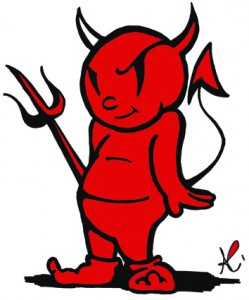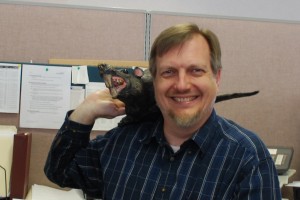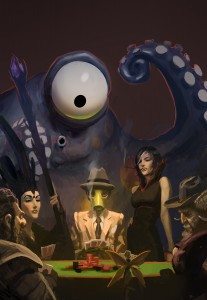
What follows is the true story of how the King of the Ogres got the Royal Piemaker of Felmon to give the ogres free pies, forever.

Hunger
The ogre king, whose full name was King Arguthus Grunthos the Whatever-Comes-After-Fifth, listened to his stomach grumble.
King Grunthos led a small tribe of ogres that lived inside a mountain that stood just outside the city of Felmon. He was the strongest ogre in his tribe. He could lift two cows over his head, one in each hand. He was also the smartest. He could count out five cows from any herd and almost never end up with four or twelve. But being strong and smart was no defense against the scent of freshly baked apple pie or pecan pie or blueberry pie that the wind sometimes brought up the mountainside, right where Grunthos could draw it into his lungs but never, ever, taste it.
The pie aromas came from a brand-new house at the very edge of Felmon, so far from the Queen’s castle that it almost seemed to be part of the eastern forest. This house belonged to Felmon’s Royal Piemaker, and it just happened to be almost directly under the main entrance to the ogre caves. All too often, sweet, tangy scents from that house crept up into the caves, and the ogres went to sleep feeling hungry no matter how much meat or fruit they’d managed to eat that day.
Did the piemaker ever offer to share his pies with the ogres? No.
As time passed, the enticing smells felt like insults, and it wasn’t long before King Grunthos decided to take a stand for all ogres everywhere.
He would make the piemaker give his ogres all the pies in the world.

The Boulder
One day when King Grunthos tripped, fell down the mountain, and landed somewhat near the piemaker’s house, it occurred to him that a big boulder pushed just the right way would roll down the mountain and right into that house, teaching the Royal Piemaker a thing or two about respecting ogres. There were some huge boulders buried in the mountainside that would work perfectly, but they were too big and heavy even for him.
He went back into his caves and shouted, “Volunteers!”
Some particularly dim ogres who thought “volunteers” meant “food” came forward. So did the ogre named Four-Toes, who acted as if he thought he should be the king, and always second-guessed Grunthos’s decisions. So the King explained his plan very slowly. Every ogre except Four-Toes nodded, looked around for the food, couldn’t find it, and wandered off. Grunthos chased after them and pulled them back to the main cave entrance.
“We need to show humans that ogres work together and be scary force for evil,” Grunthos said, trying again. “Then humans give us anything we want.”
“Like rabbits?” Four-Toes said.
“Sure,” Grunthos said. “But more about pies. We make them cook pies all day.” He imagined whipping humans who wore aprons and were near a stove. Grunthos didn’t know much about pie making, but he knew you needed a stove at some point. And aprons. That’s what the piemaker had always worn when Grunthos had seen him in Felmon, back before Felmon passed a “no knocking over the market carts and stealing all the food or we’ll hunt you down on horseback” law that pretty much meant ogres no longer had any reason to go there.
Grunthos led Four-Toes and two other ogres to an enormous boulder buried in the mountain. They spent an hour digging it out. Just as they were about to let it roll down the mountain, Grunthos shouted, “Wait!”
Four-Toes held the boulder steady. “Why?”
Grunthos looked carefully. He could see the bottom of the mountain but not the piemaker’s home. “Will miss.”
“Naw,” Four-Toes said. “I aim good.”
Grunthos pointed to his left. “House over there.”
Four-Toes squinted into the distance, shrugged, then shoved the boulder a few inches to the left. “Now?”
“No! Climb higher. Aim from top. Be sure see target.”
Four-Toes looked up. “Top a long way.”
“Have to see target,” King Grunthos said.
The other ogres talked amongst themselves and decided the King was right, but that the King had to do most of the pushing to get the boulder uphill. Grunthos, proud of how the other ogres recognized his superior strength, took a position below the boulder and started rolling it up the mountain. “Ogres help!” he shouted. “Push boulder!”
The other ogres got on the opposite side of the boulder and started pushing it down the mountain.
“Stop!” Grunthos shouted. “What you doing? Up the mountain!”
Four-Toes leaned around the boulder’s side. “Want boulder go up, then down?”
“Yes!”
Four-Toes looked down, then up, then down. “Seem waste of time.”
As patiently as he could while still keeping thousands of pounds of boulder from rolling over him, Grunthos explained the problem again.
“Oh,” Four-Toes said. “Piemaker!”
“Yes, piemaker! We crush house, remember? Why you think we dig boulder out?”
“Looked like fun.”
With a frustrated sigh, Grunthos shoved the boulder forward. “Up, then down!” he shouted, making a chant out of it. “Up, then down!”
The other ogres, finally getting it, helped push. “Up, then down! Up, then down!”
A good, long sweaty time later, the ogres had the boulder at the top of the mountain. Grunthos could easily see the piemaker’s home now. “There, see?”
Four-Toes looked. “Uh-huh!”
The other ogres looked, too. “Uh-huh!”
“Now then,” Grunthos said, and that’s when he heard the rumbling. The boulder was rolling down the mountain all right. Straight at the city of Felmon’s rear gate.
The other ogres cheered. “Up, then down!”
Grunthos leaped after the boulder, realized he’d never catch up to it, and stood paralyzed as the boulder gathered speed and started a small avalanche. It bounced down the mountain, plowed through the gate, and crashed into a guard tower.
Far below, human soldiers leaped onto horses and began riding hard towards the mountain. Following the tradition of great leaders everywhere, King Grunthos pointed at his fellow ogres, yelled, “They did it!” and ran back to the caves.

The Giant Bird Army
When a bird flew over Grunthos’s head and released a particularly nasty dropping into his hair, the King got an idea to form a huge bird army that would bury the piemaker’s hut in manure. The King saw a goose fly by, knocked it out of the sky with a well-thrown rock, cooked it, and ate it. Somewhere around his fourth bite, he realized that eaten birds wouldn’t form much of an army. And there weren’t enough geese around anyway. So he yelled at some sparrows in the distance just to remind them who was king around here and went back inside to think of something else.

The Catapult
The idea of making things fall onto the piemaker’s house stayed with Grunthos. He needed one of those big rock-throwing things like Felmon’s soldiers had. He’d heard a soldier call them “catapults.”
He found the smartest ogres he could, plus Four-Toes, who the King had to admit was terrific at building things.
“Four-Toes,” Grunthos said, “I need catapult, like humans have.”
Four-Toes dropped to his knees and made kissy noises. “Here, cat!”
Grunthos pulled Four-Toes back up to his feet. “No. Machine thing that throw rocks long way.”
Four-Toes squeezed his face in concentration. “Don’t think cats can do that.”
Grunthos drew a picture on the ground, with a stick.
“Oh those,” Four-Toes said. “Okay, we build one.”
Grunthos spent the next few days waiting impatiently, until finally Four-Toes showed him what they’d made.
Remarkably, it looked like a full-sized, fully functional catapult. Equally remarkably, the ogres had built it in a cavern just barely big enough to hold it. And since that particular cavern’s sole entrance was only half as wide as the catapult’s base, there was no way to get the catapult out.
Grunthos eventually saw the problem. “How we use this?”
“Easy,” Four-Toes said.
“Must use outside,” Grunthos reminded him. “Where piemaker is.”
Four-Toes nodded again. “Easy.”
“Show how.”
Four-Toes pointed to the thick, taut rope tying the head of the catapult’s launching arm to its base. “Pluck string. Make bad music. Piemaker run away.”
Had Grunthos been human, a deep well of despair would have opened inside him right about then. Since he was an ogre, he instead experienced a vague dizziness. “Will piemaker hear bad music? Don’t we move catapult outside?”
Four-Toes looked at Grunthos, then looked at the catapult. Then he looked at the narrow cave exit. Then back at the catapult. Then back at the exit. Then at the ceiling.
“Need cat,” he said.
Grunthos had a great idea. “Build smaller catapult.”
“Oh, smaller,” Four-Toes said. “Okay. Still need cat, though.”
“No,” Grunthos said. “Don’t need cat.”
“Hmmm,” Four-Toes said. He looked at the catapult for a while. “Mouse-apult,” he said.
Had Grunthos been human, he would have cried.

The Smaller Catapult
Days later, after much trial and much more error, the ogres had built a smaller catapult that could be taken outside. It could launch a watermelon fifty yards in any direction except the one they aimed in. Grunthos, undeterred, explained his plan to rain watermelons down onto the piemaker’s hut until the piemaker gave in to their demands. The plan fell apart when the ogre in charge of making sure no one ate the watermelons ate the watermelons.

The Spy Mission
If he couldn’t rely on his fellow ogres, King Grunthos figured, then he’d do everything himself. After several days of staying a short ways from the piemaker’s home and shouting threats, King Grunthos mistook a rock on the ground for a slightly different kind of rock, and that gave him an idea. He’d use a disguise. He’d kidnap the piemaker’s granddaughter, dress as the girl, and thus gain entry to the Royal Kitchen.
Around sunset, as the piemaker came home from work, Grunthos crawled along the ground, hoping the somewhat high grass would shield him from the granddaughter, who was playing with dolls in the front yard. He needed to study her clothing and how she behaved if he was going to imitate her successfully. True, he was six feet taller than the girl and four hundred pounds heavier, but he knew the piemaker wore spectacles. If he could take the spectacles away, the piemaker’s bad eyesight would make the piemaker believe Grunthos was a little girl.
Grunthos hid behind a young oak tree in the piemaker’s front yard. To disguise his head as part of the tree, he held a piece of straw in front of his face so it would look like birds were building a nest there.
The girl looked up from her dolls, then turned towards her house. “Grandpa! The ogre’s back!”
Grunthos froze. But he didn’t want to jump to conclusions. The girl might have been talking about some other ogre.
The piemaker opened the front door and looked straight at him.
Grunthos bellowed, “Chirp! Tweet!” He shook the straw in front of his nose, which made him sneeze. He wiped his nose with his arm and leaned out from behind the tree. “Bird sneezed,” he told the piemaker.
The piemaker came outside, got the girl and her dolls, and led her back inside the house.
Grunthos nodded. His plan was failing, but he was pretty sure he could fix it. Just in case they hadn’t seen him, he sneaked back to his caves, only once stubbing his toe on a rock and screaming so loudly that he made trees shake for several miles. But other than that he was pretty sure he didn’t make a sound.

The Disguise
The next day, around sunset, Grunthos appeared at the piemaker’s front door. Grunthos was wearing a bearskin coat that reached down to his knees. He’d stained it with berry juice, and if you stood far enough away and had no particular knowledge of dresses, you might think it sort of looked like a dress. Or a rug.
He forgot to hold back his great strength and knocked on the piemaker’s door so hard he punched it off its hinges. The door slammed against the floor, startling him. When the piemaker appeared with a pitchfork in his hand, Grunthos remembered his plan. “I am little girl who lives here who was kidnapped by evil ogres but I escaped. Ogres really smart and strong and you should give them pies!”
It came out exactly as he’d rehearsed it.
The piemaker’s jaw hung slightly open. After a moment, he said, “Well, I guess you’d better come in, then.”
The plan was working perfectly! Grunthos wedged his body through the open doorway, pulled a chair out from the piemaker’s dining table, and sat on it. It broke with a sharp crack followed by a thud as Grunthos landed on the floor.
The piemaker went down the house’s only hallway. He said, “Debra, we have a visitor.”
The girl in the blue dress came running down the hall and shrieked when she saw Grunthos.
“No no,” the piemaker said. He picked up the girl and whispered into her ear. She looked surprised, then giggled. He put her down. “So, my granddaughter,” he said to Grunthos, “you were kidnapped.”
“I was?” Grunthos said.
The girl giggled again.
Grunthos remembered his plan. Then he saw the little girl and realized there might be a flaw in his plan. It was the only plan he had, though, and he wasn’t the kind of ogre who gave up just because things got difficult. “Oh yes,” he said. “Smart and dangerous ogres kidnapped me. Won’t return me unless you give them pies.”
The girl laughed. The piemaker said, “It looks like you escaped.”
Grunthos thought for a moment. He remembered a slogan the piemaker himself had once used at a fair and thought it would apply here. “The first one is always free.”
The girl said, “You’re dumb.”
“Debra!” the piemaker said. “Be nice to our guest.”
Grunthos continued with his plan. “Even though I escaped, ogres will take me back to caves again. I never escape again because ogres too smart and evil and I little girl. So better give them all the pies.”
“Well,” the piemaker said, “I’d consider it, but maybe we should wait for the ogres who kidnapped you to come by and make their demands.”
Grunthos said, “Okay,” and scooted over by the doorway to wait.
The piemaker washed some dishes in a bucket of sudsy water and dried them with a thick cloth. The girl sat politely at the table for a while, then said she was tired and asked to go to bed. The piemaker led her down the hall, then came back to the dining room. Night fell. The piemaker read a book by candlelight. The ogres did not appear with their demands.
Stupid ogres, Grunthos thought. The plan was working so perfectly, and his fellow ogres were messing everything up again.
Eventually, the piemaker said good night to Grunthos and went to bed.
“Good night,” Grunthos said. He continued to wait by the door.
Around midnight, it occurred to Grunthos that it might be time to abandon his plan after all, and he returned to the caves to think.

The Demand
The next morning, Grunthos returned to the piemaker’s house. The piemaker was getting on a horse, and two men dressed in the Queen’s colors were attaching a new door to the piemaker’s house. The men leaped to attention when they saw Grunthos, but the piemaker calmed them down.
Grunthos was dressed in his regular furs now. He held the other, stained, fur towards the piemaker for inspection. “This proof,” he said, reciting the script he’d made himself memorize.
The piemaker said, “I’m late to the bakery as it is, thanks to you. Proof of what?”
“I am ogres who kidnapped your girl! This is blue dress!”
“That? It’s got rats hanging from it.”
Grunthos had noticed the rats and had prepared a reply. “That is your fault. You bad man. For shame, make little girl wear rats!”
One of the soldiers drew his sword. “I can—”
“Oh, put that away,” the piemaker said. The soldier gave Grunthos an ugly look and returned the sword to its sheath. The soldier was putting on a great act of not being even slightly afraid of ogres, but Grunthos knew better.
“Look,” the piemaker said. “I think I see what’s going on. You’re one of the ogres who live in the mountains.”
“Yes,” Grunthos said with nearly total confidence.
“And sometimes I bake a pie or two at home, so sometimes you smell pies when the wind carries just right.”
Grunthos decided he didn’t like part of the piemaker’s earlier statement. “I not any ogre. I ogre king.”
“Well, that’s even better. You’re a king and I’m the Royal Piemaker. So you think I should make pies for you, too.”
Grunthos considered all of that and decided it made sense. “Yes.”
“You know, though, this isn’t my bakery.” He pointed to his house.
“But you piemaker.”
“And I work in the Royal Bakery. I supervise six other bakers. We make dozens of pies a day. Did you really think I made all those pies myself, in this little building?”
Grunthos considered all of that and decided it made sense. “Yes.”
The piemaker sighed. “I’ll tell you what. Every once in a while, even the best bakers make mistakes. Do you understand what I’m saying?”
Grunthos tried hard and failed. “No.”
“I’ll put it this way. Would fifty pies be enough to satisfy you?”
Grunthos imagined a pile of pies so big he could climb it and reach the moon. But that many pies might not fit in the cave. How many was fifty? “Fifty pies a day?” he asked.
“Fifty pies, once a month. On every full moon.”
A month had even more days in it than one day! Fifty pies a month would be huge. And… “Full moon near.”
The piemaker nodded. “It’ll appear in just one or two nights. So that’s the deal.”
Grunthos could almost taste all those pies. “We have deal,” he said.

Homage
What follows is the false story of how the King of the Ogres got the Royal Piemaker of Felmon to give the ogres free pies, forever.
“Then pick up girl,” Grunthos told his ogres, all of whom had a pie jammed in their mouths. “Shake girl rough. Tell piemaker, make pies for ogres!”
The ogres cheered.
“Or I come back and kick house down and throw girl in river! And piemaker say no, no, please big strong ogre, please take pies and leave alone! And I say not enough give pies once, no, must give pies every full moon…forever!”
The other ogres stopped munching and stared at their king.
“Forever?” Four-Toes asked.
“For as long as moon in sky,” King Grunthos said.
The ogres looked at each other with naked amazement. Then they looked at the wheelbarrow of overbaked, underbaked, underfilled, improperly decorated, or accidentally dropped pies their king had brought them.
Four-Toes put a hand on Grunthos’s shoulder. “You best king ever.”
Grunthos almost fell over with pride.
Then Four-Toes said, “But why fifty pies? Why not all pies?”
King Grunthos thought for a moment. “Humans need pie too.”

That last part, of course, is absolutely true.

About the author:

Tarl Kudrick is the founder, co-publisher, and chief editor of the online fiction magazine “On The Premises.” He’s been published in ChiZine twice, the still-missed Town Drunk, and Jersey Devil Press, and will have a story in a 2012 fall anthology to be published by Cliffhanger Books. He’s also a human resources consultant with a Ph.D. in psychology.

UFO Publishing brings you a free humorous story every month. Click here to read more.
If you enjoy our web content and wish to read 29 more such stories, please pre-order Unidentified Funny Objects today!
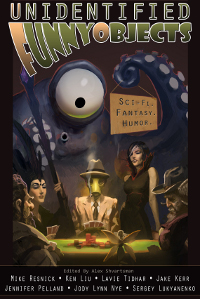

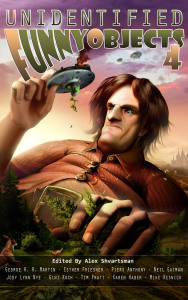
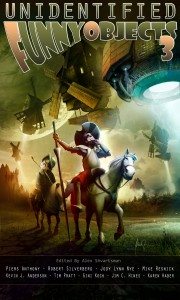
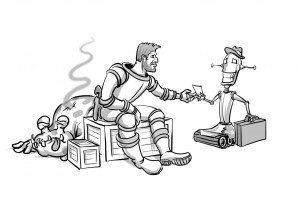


![sunset By Photo by Heather Abounader (www.abounaderphoto.com abounaderphoto.blogspot.com Heather Moreton from Louisville, KY, USA) (12/28/08 Sunset Uploaded by Princess Mérida) [CC-BY-2.0 (http://creativecommons.org/licenses/by/2.0)], via Wikimedia Commons](http://www.ufopub.com/wp-content/uploads/2013/02/sunset-300x200.jpg)


